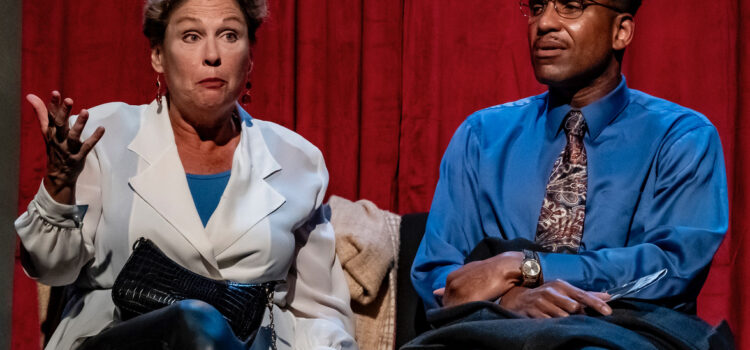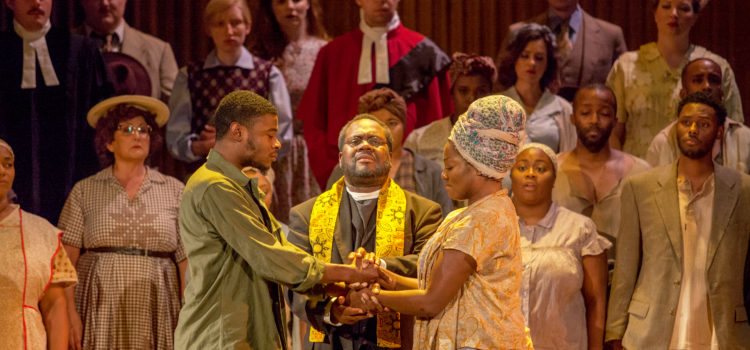By Lynn Venhaus
This year’s LaBute New Theater Festival dives right into blistering topical commentary on our great societal divide, and while “Safe Space” is one of the playwright’s sharpest one-acts in the fest’s nine-year history, the best play is about a troubled prizefighter who hasn’t been in the news for decades.
“One Night in the Many Deaths of Sonny Liston” by JB Heaps of New York City is a masterfully constructed conjecture about what might have happened the night the former heavyweight champion died on Dec. 30, 1970.
Both plays feature Reginald Pierre, who has frequently been a part of the festival since it began in 2013, and next to his outstanding work as Lincoln in “Topdog/Underdog” that same year, this is his finest hour, as Sonny Liston and as a theatergoer in “Safe Space.”
In a revelatory performance as Liston, Pierre conveys bravado, hurt, resentment, and toughness recounting how, as a celebrated and feared sports figure, he faded from glory as his bad boy reputation persisted.
Considered an outsider, his difficulties adjusting to fame, and those demands that led to his downfall are documented by Heaps in clever dollops of dialogue, as Liston opens up to a professional escort delivering a “Christmas present” from sordid types he does business with, at his home in Vegas.
While only hinted at, these presumed underworld figures are connected to a multi-state mob syndicate. All very shady, the real details are murky, and Heaps weaves a plausible tale because the tango Pierre does with Eileen Engel, playing this mysterious woman, is riveting.
With a world-weary air and looking glamorous in a glitzy evening gown, Engel’s smoothness makes us question whether she’s compassionate or has ulterior motives, and the more Liston spills the tea, what is her story?
As Pierre, who does not physically resemble an imposing boxer, skillfully peels back layers on Liston, he divulges a litany of hard-knock life injustices, his triumphs in the ring, and his torment over being blacklisted by the boxing establishment.
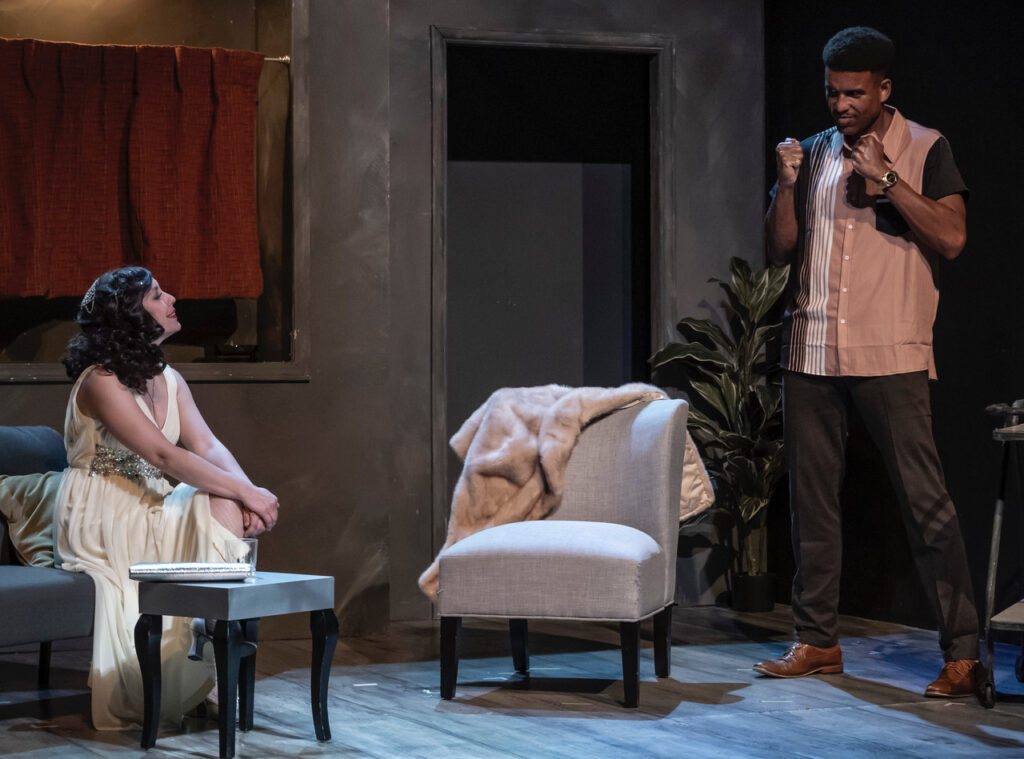
Through exposition, Heaps shares key facts about one sharecropper’s son, born in Arkansas, an ex-con who knocked out Floyd Patterson, tussled with Muhammad Ali, hobnobbed with the rich and famous – and is included in the famous artwork on The Beatles’ Sgt. Pepper’s Lonely Hearts Club Band album cover. For real!
Thoughtfully directed by Kari Ely, she lets the drama unfold naturally while Pierre and Engel establish a rhythm, keep each other sharp, projecting both a mutual like and a distrust. It was one of the few plays in the line-up that was gripping until the very end.
The climactic impact is genuine, bolstered by the superb performances but also Heaps’ knowledge of the subject. A second-act playwright at 71, he retired from a television career as an executive producer for Showtime Sports where his shows on boxing won five Emmy Awards. (As they say, write what you know).
Liston’s death has remained suspicious for some 50 years, fueled by knowledge that he was a heavy drinker and used heroin. While no one knew for sure, his age was estimated at 40. His wife, Geraldine, whom he married in 1950, was from St. Louis and there visiting her mother over the holidays. She discovered his body about two weeks after authorities think he died.
Because Pierre gives emotional heft to a tragic, larger-than-life figure, you may want to find out more about the guy, nicknamed “The Bear,” and there is a 2019 Showtime documentary called “Pariah: The Lives and Deaths of Sonny Liston.”
Heaps’ play opens the second act, while “Safe Space” kicks off the presentation.
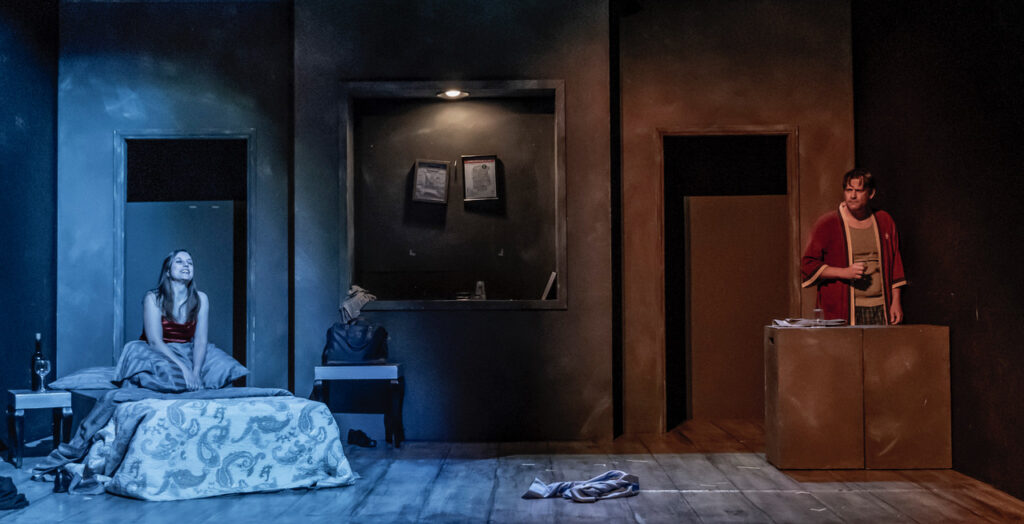
LaBute, the provocateur, through shrewd writing and supple performers, tackles the current state of “us vs. them,” the culture wars and racial friction in the U.S., in “Safe Space.” It is through the theatrical lens that he explores how we got to this point and is today’s state of outrage histrionic or necessary.
Here, he seats a privileged white woman (Jane Paradiso) next to a black theatergoer (Reginald Pierre) for a performance advertised as a special evening for African Americans to come together for this show, although they allowed others to purchase tickets too. The Man attempts to be polite in the shared space, but the Woman feels his agitation, and let the verbal sparring begin.
LaBute, the longtime playwright and screenwriter, has written a new work for every festival, and his highly verbal and rhythmic dialogue is well-suited for one of his favorite themes – political correctness. And add the divisive climate now infiltrating every aspect of daily life, and let the fur fly.
We’re at a point where any little thing we say — whether misunderstood, taken out of context, or deemed inappropriate, will be used against us in the public court of opinion. And is anyone really listening anymore or just shouting to be heard? “Safe Space” touches on all those notes.
The points of view here are strong, so if you wince at any confrontation, be warned. But it is a lively exchange that does come to some sort of truce. And a time capsule entry for 2023.
Paradise is captivating as a woman huffy about being perceived as entitled, but then demonstrating why one could understand that observation and Pierre easily throws shade with some glances and reactions, defensive about why he’s pitching a fit. Both are deft in their delivery, and John Contini astute in his direction of the rapid-fire, razor-sharp piece.
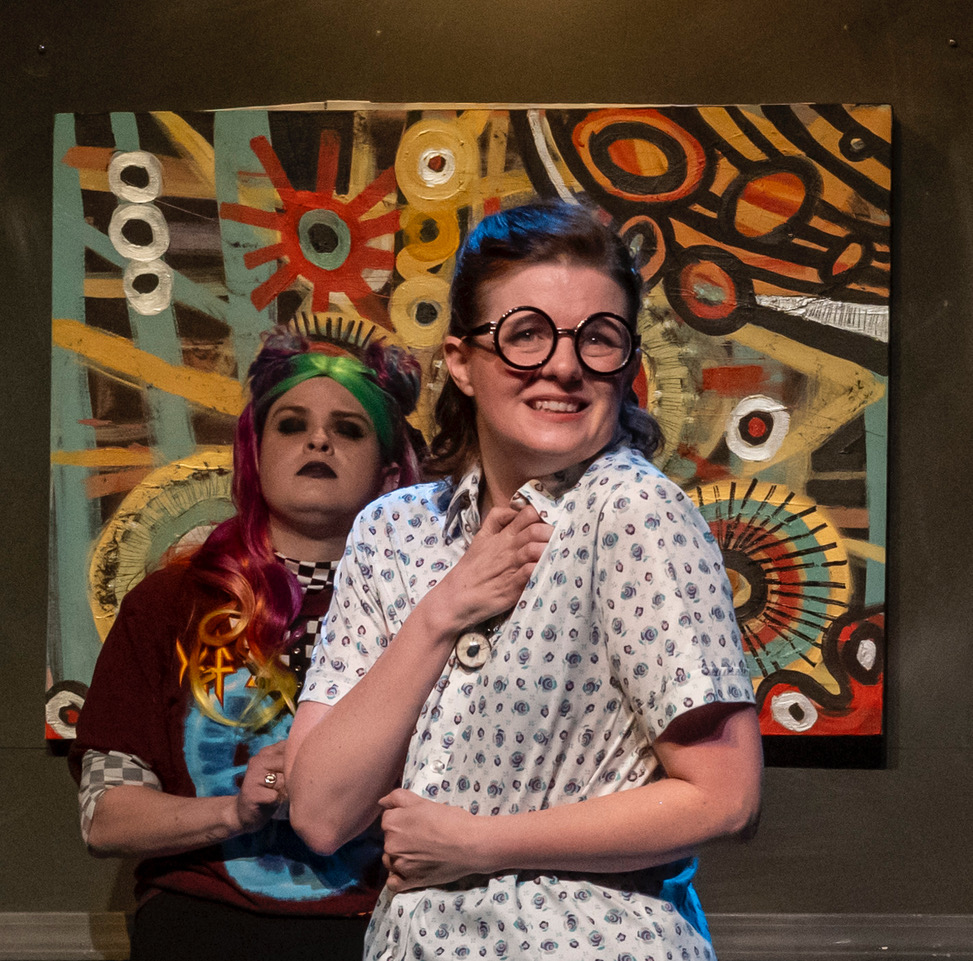
Like LaBute’s play, the others utilize the intimacy of the black box stage to their advantage. The festival features works that have up to four characters.
The other three dramas in the line-up this year include “The Blind Hem” by Bryn McLaughlin of Oregon, “DaVinci’s Cockroach” by Amy Tofte, and “The Mockingbird’s Nest” from Craig Bailey of Vermont.
I heard someone in the audience compare the offerings to a box of chocolates. The plays, always a mixed bag, are memorable when they are a touch strange and keep us off guard. Others prefer less edge, but different is better than staid.
In any case, the talent is usually affecting, and this year, the format lends itself to their particular strengths. Colleen Backer, who excels at portraying eccentrics, is a jittery scientist named Dana whose work destroys things. Perhaps she’s soulless, she seems guilty about the way her life has gone. Loathe to connection, she does engage with a staff member, Finn, who is having a bad day at an art museum in “DaVinci’s Cockroach.”
They talk about things trivial and big-picture, and you want to know more about the pair, to an extent. But hen Tofte just goes on for far too long. But Laurel Button is impressive as a kooky, colorful young woman for whom art brings joy.
“The Blind Hem” is a melancholy-tinged romance between a college professor and a former student – hence named after the ‘invisible’ stitches in a garment, and is one of those character studies where you have to read between the lines to fully grasp what is happening, and what transpired before we entered their cheap motel room. Anthony Wininger is Robert, a conflicted man fooling himself about life, while Eileen Engel is Kate, no longer in school but still naïve.
They’re fine, although unsympathetic, but does McLaughlin’s play say anything new or explore another facet of an illicit romance that we haven’t seen before?
“The Mockingbird’s Nest” takes on another familiar topic – an aging parent’s dementia but does so with a technological twist. We’ve wound up in the twilight zone, and that’s a clever aspect of Craig Bailey’s piece. But despite Backer and Paradise’s splendid portrayals, the play ultimately loses steam by not trimming what seemed to be a tacked-on ending.
The production crew is efficient in setting the scenes for each show, and Abby Pastorelli’s costume design nails each personality in a simple yet effective way. She also did the artwork shown, which is for sale.
A 10-member panel selects the plays from submissions across the country. It’s nice to see a rebound from the pandemic that halted theater, then delayed its reboot with those pesky variants.
The presentations offer food for thought, an opportunity to see something thought-provoking and watch local performers shine, but best of all, support new work.
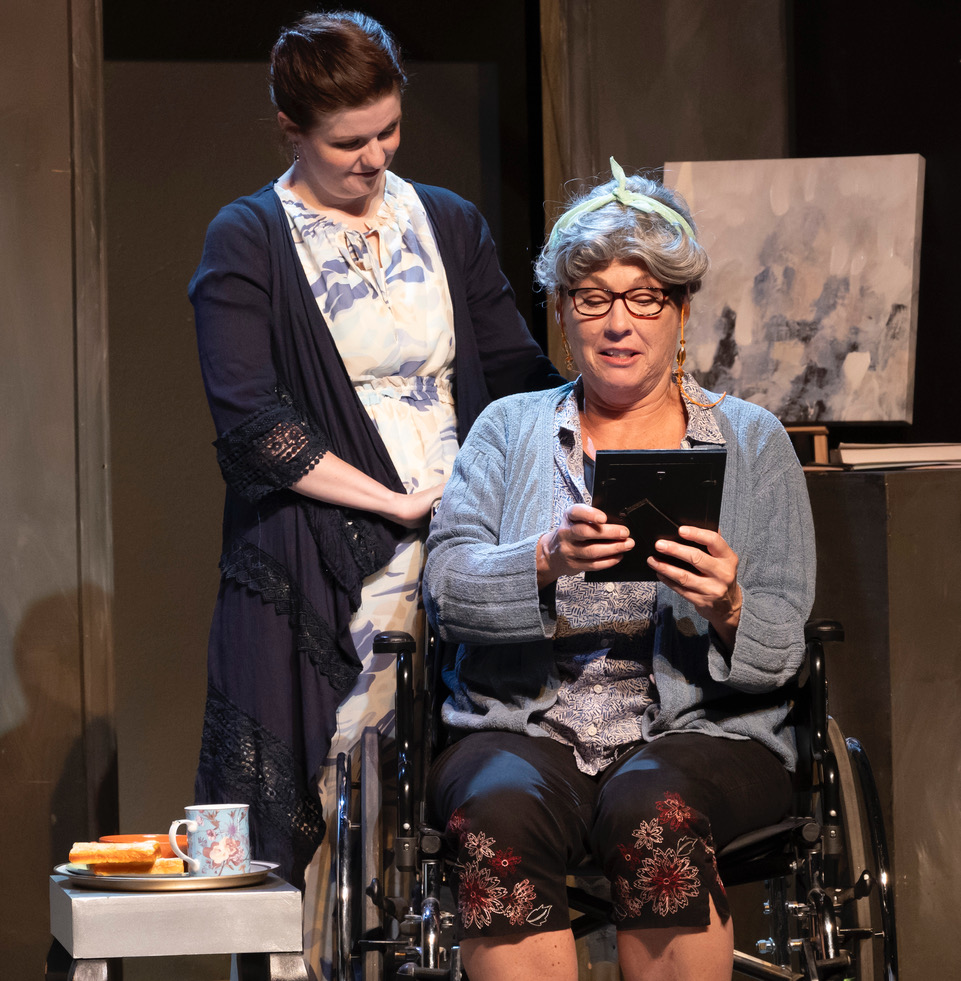
St. Louis Actors’ Studio presents the ninth annual LaBute New Theater Festival July 7 to 9, July 13-16, and July 20-23, with performances at 8 p.m. Thursday through Saturday and at 3 p.m. on Sundays at The Gaslight Theater on North Boyle in the Central West End. For more information: www.stlas.org

Lynn (Zipfel) Venhaus has had a continuous byline in St. Louis metro region publications since 1978. She writes features and news for Belleville News-Democrat and contributes to St. Louis magazine and other publications.
She is a Rotten Tomatoes-approved film critic, currently reviews films for Webster-Kirkwood Times and KTRS Radio, covers entertainment for PopLifeSTL.com and co-hosts podcast PopLifeSTL.com…Presents.
She is a member of Critics Choice Association, where she serves on the women’s and marketing committees; Alliance of Women Film Journalists; and on the board of the St. Louis Film Critics Association. She is a founding and board member of the St. Louis Theater Circle.
She is retired from teaching journalism/media as an adjunct college instructor.

